|

With session’s end, dirty legislation dropped on Dayton’s desk
After three months of debate and discussion, the Minnesota Legislature on Sunday concluded its 2018 session following the passage of several last-minute bills. Governor Mark Dayton has less than a week and a half to decide whether to sign, veto, or modify spending in the bills that remain on his desk.
Fortunately, Governor Dayton has already vetoed several bills that would roll back environmental protections. We thank the Governor for vetoing:
- The Line 3 Giveaway bill: This bill would have given Enbridge Energy immediate approval to construct its proposed pipeline along the company’s preferred route. It would have bypassed the Public Utilities Commission’s process for considering whether to grant a certificate of need to the project, a process that is scheduled to conclude with final hearings in June. This would have betrayed thousands of Minnesotans who have testified and engaged throughout the process.
- The Omnibus Supplemental Budget bill: This bill tied funding for programs to a pile of bad policy. Among the provisions were cuts to the Renewable Development fund, a 16-year holiday for industry to avoid responsible water treatment, and an irresponsible rollback of our protection against the spread of invasive species between Minnesota’s waters.
Now, we call on Governor Dayton to hold the line for our environmental protections and veto:
- Items in the Bonding Bill that would raid our Environment and Natural Resources Trust Fund: This fund was created by Minnesota voters via a constitutional amendment to spend lottery money on research and projects that help clean up and conserve Minnesota’s natural resources. This legislation would improperly take that money to spend on ordinary sewers, a basic government service. While these are worthy projects, they should be funded responsibly, as they have been traditionally, with state bonding – raiding the Trust Fund leaves it open to further raids for inappropriate purposes in the future.
- The Guilty by Association Bill, which would create broad penalties against citizens and organizations who support or attend a protest where so-called “critical infrastructure” is damaged. For example, a person who attends or supports a protest against a pipeline at which someone else damages the pipeline could be held liable, even if they had nothing to do with the action. It’s against Minnesota values of democracy and free speech, and it’s targeted at those who want to protect our water and public health.
- The bill to gut protections for wild rice waters by short-circuiting the regulatory process for sulfate pollution. It would allow new industries like the PolyMet and Twin Metals sulfide mines to be completely exempt from requirements to control sulfate pollution that kills off wild rice and increases harmful mercury levels in our lakes, rivers and streams. The Governor vetoed the Legislature’s previous bill in hopes of a better compromise on protecting wild rice, but this bill is a step backward, not forward. (Use our action alert below to ask Governor Dayton for a veto!)
We thank Governor Dayton for standing against rollbacks to Minnesotans’ health and resources in his final session. And we thank all the Minnesotans who have spoken up to ask the Governor and the Legislature to protect Minnesota values!
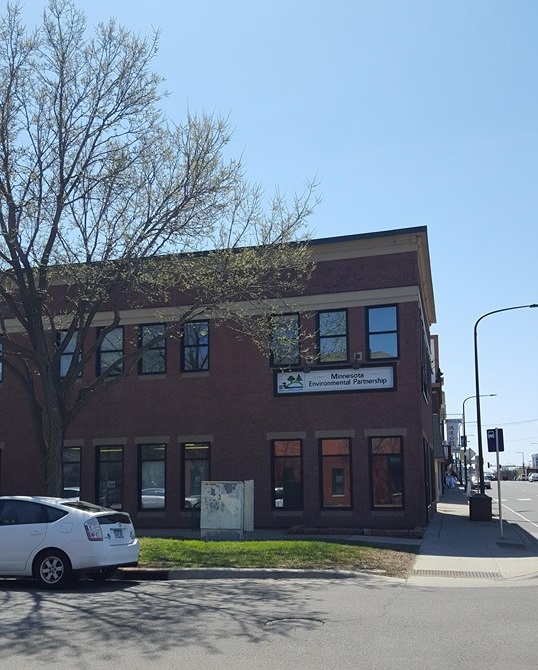 |
Office space available in MEP’s building!
Is your organization in the market for a convenient, comfortable office space in St. Paul? The office suite above MEP’s office at 546 Rice Street is available for lease! The approximately 2200 square ft. space is ideal for a small to midsize nonprofit organization, featuring a kitchen and break area and offstreet parking.
Located in the Capitol-Rice Street neighborhood, it is also within three blocks of the Capitol complex and across the street from the Women’s Building. It is also positioned along bus routes 3, 62, and 67, and a two-minute walk from the Green Line. And perhaps best of all, the new tenant would have good neighbors in MEP’s staff!
Please contact Matt Doll at matthew@mepartnership.org if interested.
|

|
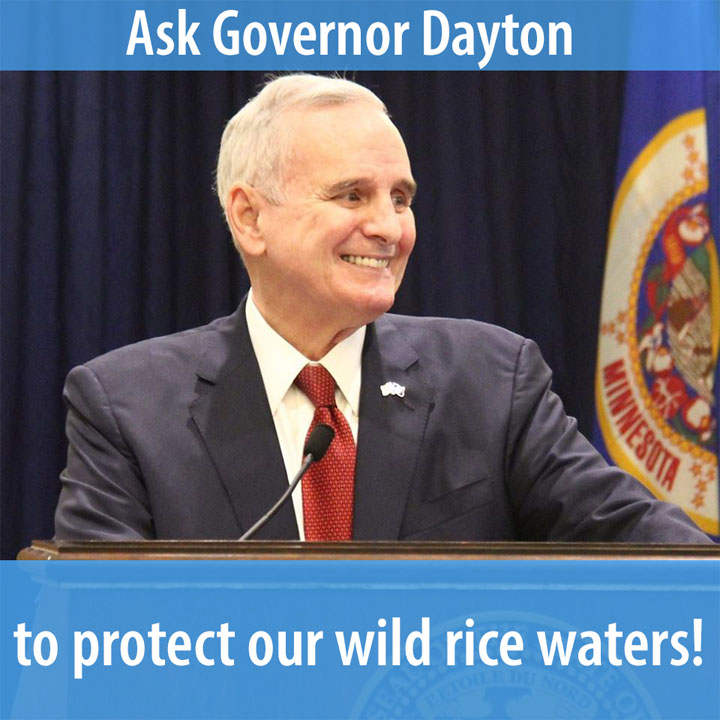 |
Ask Governor Dayton to please veto the second wild rice bill!
The harmful Wild Rice bill (that would’ve nullified the protective sulfate standard for wild rice) moving through the legislature all session was vetoed by the Governor. But then on the last day of the session, a conference committee (9 of the committee’s 10 members had co-authored the previous bill) put together a new bill. They emerged from discussions touting the new version as a “compromise.” It is not.
There are many things wrong with this bill – learn more using our Action Alert, and please call the Governor’s office at 651-201-3400 and ask for another veto!
|
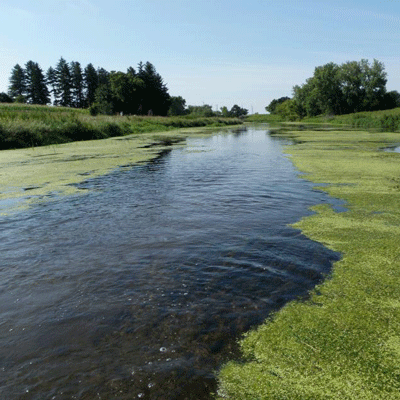
photo credit: MPCA |
Dayton veto brings GOP counterpunch to governor’s groundwater legacy
(From MPR News, featuring MEP Executive Director Steve Morse) — A new Minnesota Department of Agriculture rule aimed at protecting drinking water from nitrates could be delayed for a year after last-minute politicking at the State Capitol. The GOP-controlled Legislature sent Gov. Mark Dayton an agriculture policy bill just as the Legislative session was ending. The House and Senate agriculture committees followed up with some additional pressure: If the governor didn’t sign the bill, the committees said, they might invoke an obscure 2001 law that allows the Legislature to halt executive-branch rulemaking. Dayton vetoed the ag policy bill on Monday. And now, lawmakers are moving toward delaying his agriculture department’s groundwater protection rule, which establishes voluntary and mandatory farming practices in areas of the state where nitrate contamination is a problem. >>Read More.
|

|
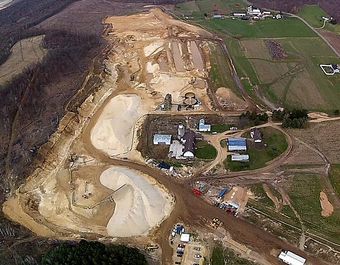 |
10 million gallons of mine sludge turns Trempealeau River orange; officials investigating spill after dramatic rescue
(From La Crosse Tribune) — State and local authorities are working to determine the environmental impact after about 10 million gallons of sludge was released from a settling pond to rescue a worker at a Trempealeau County frac sand mine. Emergency responders from multiple agencies responded to the Hi-Crush mine in Whitehall just before 8 a.m. Monday after a contractor’s bulldozer slid into the pond, which company officials said was 12 to 15 feet deep. The operator, Robbie Gunderson, was trapped inside the airtight cab of the 23-ton earth mover for two and a half hours as rescuers tried to reach him. >>Read More.
|
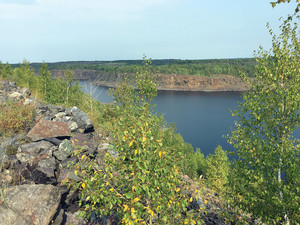 |
New Twin Metals plan moves processing plant site
(From Duluth News Tribune) — Twin Metals Minnesota on Thursday released new details for its underground copper-nickel mine planned near Ely, including a new location for its proposed processing plant. The company announced new details on its plan, which has yet to be presented for any kind of regulatory approval. The company recently won back critical federal mineral leases from the Trump administration that had been withheld by the Obama administration. The leases cover areas at and around the proposed mine site along the Kawishiwi River and Birch Lake just outside the Boundary Waters Canoe Area Wilderness. >>Read More.
|

|
 |
A well-balanced agro-ecological system is needed
(From St. Cloud Times, by Land Stewardship Project member Bryan Simon) — It’s not the cow or the sow, but the how. I hate to break it to all the conscientious consumers who have bought into the idea that completely avoiding meat is the answer to our planet’s environmental woes, but they’ve been misled. That’s right, I’m calling you out, Beyonce, Brad Pitt, Al Gore and others who are coaching fans to become vegan to save the planet. Such a message, while well-intentioned, misses the mark. Animals are not the problem; the problem is how they are managed. Animals provide valuable goods and services, like nutrient cycling, habitat diversity, clean water and soil health, but only when integrated with the land. Unfortunately, confined animal feeding operations (CAFOs) have removed animals from the land, and the consequences are evident: a rapidly changing climate, polluted water, soil loss, rampant pest problems, and barren landscapes devoid of wildlife. >>Read More.
|
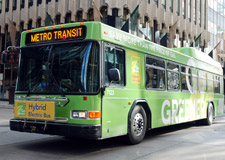 |
Minneapolis should combat climate change and inequality with bus lanes
(From MinnPost) — Go. Stop. Wait. Lurch. Wait. Go. Stop. That’s the daily experience of bus riders along Hennepin Avenue where the speed limit is 30 miles per hour and buses travel at 6 mph. The City of Minneapolis recently published a draft city plan that focuses largely on two great challenges: disparities and climate change. To address these challenges, the plan calls for “equitable and ample access” to transit options and stresses that “even with the adoption of electric cars, a 37 percent reduction in automobile trips is needed” for the city to reach its goal of reducing greenhouse gas pollution by 80 percent by 2050. >>Read More.
|
Help sustain MEP’s work. Donate today!
Do you appreciate our coverage of environmental and conservation issues? You can help sustain MEP’s work with a donation. Your support will help MEP continue educating decision-makers and Minnesotans throughout the state about important issues that impact clean water, clean air, and land conservation. Contributions also provide the financial backing we need to help organize the advocacy efforts of our 70 member organizations and take action through public organizing, media campaigns, lobbying, and research.
|
Weekly Environmental Trivia – Answers Below Job Postings!
|
 |
1. What invasive insect has the scientific name Agrilus planipennis?
2. How many rivers in the world have larger drainage basins than the Mississippi?
3. What state trail, stretching from Grand Rapids to Ely, is Minnesota’s longest?
|
Upcoming Environmental Events
Tend the demonstration prairie at Ole Olson Park, May 31
Above the Falls Regional Park, Minneapolis
Hosted by Friends of the Mississippi River
Plant shrubs, grasses and wildflowers at the Vermillion AMA, June 2
Vermillion Aquatic Management Area, Farmington
Hosted by Friends of the Mississippi River
WaterFest 2018, June 2
Phalen Regional Park, St. Paul
Hosted by Ramsey-Washington Metro Watershed District
Film and Speaker on Ocean Acidification, June 3
Davannis in Woodbury
Hosted by Southeast Metro Climate Action
Launch Party: Unveiling Our New Name & Expanded Vision, June 4
Dual Citizen Brewing Company, St. Paul
Hosted by Transit for Livable Communities & St. Paul Smart Trips
Jobs and Volunteer Opportunities
Organizing Representative – Duluth | Sierra Club North Star Chapter
Part-Time Administrative Associate | Wind on the Wires
Minnesota GreenCorps AmeriCorps Member | Minnesota Pollution Control Agency
Executive Director | Minnesota Solar Energy Industries Association
Data Manager | Minnesota Center for Environmental Advocacy
Office Manager | River’s Edge Academy
Warner Nature Center Director | Science Museum of Minnesota
Program Intern – Summer 2018 | Clean Water Action
Chief Financial Officer | Environmental Initiative
See all job postings
Trivia Answers: 1) Emerald ash borer. 2) Three – the Amazon, the Congo, and the Nile. 3) Taconite State Trail
|
|
|